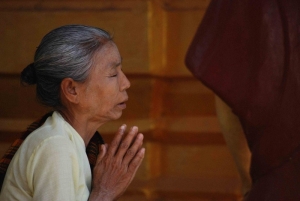Research Examines Baby Boomers’ Faith or Lack of
April 22, 2015 / by Vincent Lim- Giving
- Research
Do people become more religious as they age?
To find the answer, the John Templeton Foundation has funded a new research study by Vern Bengtson, a senior scientist at the University of Southern California’s Edward R. Roybal Institute on Aging at the USC School of Social Work and AARP/University Chair of Gerontology Emeritus at USC’s Leonard Davis School of Gerontology.
“We’re asking people to reflect on how their religious and spiritual lives may have changed as they have grown older,” Bengtson said. “Our hypothesis is that the post-retirement years are an occasion for people to more seriously reflect about the meaning of life and their religious and spiritual commitments.”
Bengtson and longtime USC colleague Merril Silverstein, now the Marjorie Cantor Endowed Professor in Aging at Syracuse University, are co-investigators on the three-year $1.5 million project to better understand religious beliefs, particularly how people in their golden years identify with a religion and practice it, and how faith affects overall health and well-being as people approach death. Awareness of approaching death can often fuel a search for meaning and an interest in religion in old age.
“We’re not interviewing people who have been told that they’ll die soon, but I expect that many people will talk about experiences with severe illnesses or experiences caring for close family members with severe illnesses,” Bengtson said. “And others will say that material things have become less relevant than spiritual things the longer they have lived.”
Building on decades of research
For almost 45 years, Bengtson has followed thousands of individuals and hundreds of families as part of the Longitudinal Study of Generations, which he initiated in 1970 as a young assistant professor at USC with funds from the National Institutes of Health.
Findings from the study, which surveyed several generations of California families, resulted in over 200 published research articles and several books in gerontology, theories of aging and family sociology. Funding from the Templeton Foundation also supported research for Bengtson’s latest book, Families and Faith: How Religion Is Passed Down Across Generations.
The Templeton Foundation is dedicated to supporting discoveries related to questions about human purpose and ultimate reality. Both of Bengtson’s projects align with the foundation’s interest in the human condition and the elements of a meaningful life.
“Most research on religion and the family covers only a short period of time in a family’s life,” said Kimon Sargeant, vice president of human sciences at the Templeton Foundation. “Bengtson’s and Silverstein’s work, drawing on the Longitudinal Study of Generations survey data, will offer new understanding of how religion is—and is not—conveyed across generations of families, as well as critically examine whether religious involvement can be good for one’s health.”
A ninth wave of data for the Longitudinal Study of Generations will be collected as part of this most recent project and examine the ways religiosity is related to health, mortality and family relationships in the post-retirement years.
Silverstein will lead the longitudinal survey (quantitative) portion of the project and Bengtson the qualitative side.
Of the older individuals who will be interviewed for Bengtson’s part, about one-third will be those who have been interviewed before. The other two-thirds will be identified by leaders of religious or non-religious organizations as having a significant degree of involvement in their organizations.
Engaging religious and non-religious leaders
“We are broadening our reach,” Bengtson said. “We want to speak with priests, pastors, ministers and rabbis. Bu we want also to talk with leaders of non-religious groups, such as secular humanist societies.”
This is the first time his research team will interview secular humanists.
They will be investigating three types of trajectories of change in religiosity: those who have increased their religious participation in later life, those whose religious participation has remained the same since mid-life, and those who have lost or rejected their religious commitment in old age.
“The most intriguing group might be those who have given up on religion in their later years,” Bengtson said. “These are the real outliers. We don’t hear much about them. But neither do we hear much about those who increase their religious involvement in later life. We want to find out about both.”
The research team believes the project has the potential to alter the understanding of spirituality among the Baby Boomer generation.
“Fifty-eight million Boomers represent a great recruitment pool for churches wanting members,” Bengtson said. “But churches don’t seem to be aware of this potential.”
Addressing older adults’ spiritual needs
Bengtson and Silverstein plan to organize a conference in Los Angeles that brings together spiritual leaders, academic researchers and health care professionals, such as social workers, to discuss how to best address the spiritual needs of those in retirement and old age.
“We want to interview a sample of religious leaders to get their perspective on aging and spirituality,” Bengtson said. “We want to see what they think about religious change in later life from their experiences with the thousands of followers that they have known in their careers.”
One of the aims of the project is to reconsider what religion offers older adults and what older adults offer to religion.
Bengtson said he hopes the findings from the study can help religious and non-religious groups and organizations better support older adults’ spiritual needs.
“We want to find out what spiritual organizations are doing to meet the age-relevant needs of seniors,” said Bengtson, a past president of the Gerontological Society of America. “We want to see how they’re ministering to those with a special interest in re-engaging in spiritual life in their later years.”
To reference the work of our faculty online, we ask that you directly quote their work where possible and attribute it to "FACULTY NAME, a professor in the USC Suzanne Dworak-Peck School of Social Work” (LINK: https://dworakpeck.usc.edu)
